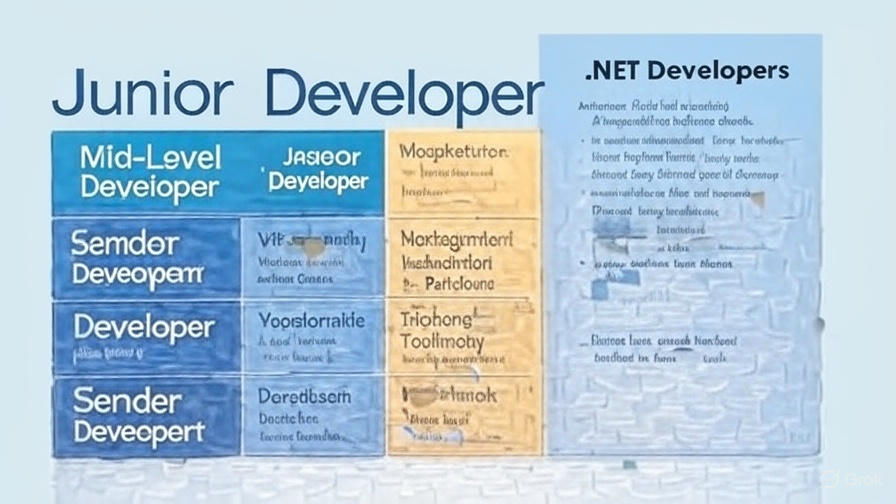Junior to Senior: Career Ladder in .NET Development
Embarking on a career in .NET development offers a promising path filled with opportunities for growth and advancement. Whether you’re just starting as a junior developer or aiming to climb the ladder to a senior position, understanding the career trajectory in .NET development is crucial. This guide will walk you through the essential steps, skills, and strategies to progress from a junior to a senior .NET developer.
Understanding the .NET Development Landscape
Before diving into the career ladder, it’s essential to grasp the .NET development landscape. .NET is a robust framework developed by Microsoft, widely used for building a variety of applications, from web and mobile to desktop and cloud-based solutions. Familiarizing yourself with the core components of .NET, such as C#, ASP.NET, and .NET Core, is the first step in your journey.
For those new to the field, enrolling in the Best .NET industrial training can provide a solid foundation. These programs often cover essential topics and offer hands-on experience, which is invaluable for junior developers.
Starting as a Junior .NET Developer
Building a Strong Foundation
As a junior .NET developer, your primary focus should be on building a strong foundation in the core technologies. This includes:
- C# Programming: Mastering C# is crucial as it is the primary language used in .NET development.
- ASP.NET: Understanding ASP.NET is essential for web development.
- .NET Core: Familiarize yourself with .NET Core for building cross-platform applications.
Gaining Practical Experience
Practical experience is key to advancing your career. Work on real-world projects, contribute to open-source repositories, and participate in coding challenges. This hands-on experience will not only enhance your skills but also make you more attractive to potential employers.
Seeking Mentorship
Finding a mentor who is an experienced .NET developer can significantly accelerate your learning curve. A mentor can provide guidance, share insights, and help you navigate the complexities of .NET development.
Transitioning to a Mid-Level .NET Developer
Expanding Your Skill Set
As you gain experience and confidence, it’s time to expand your skill set. This includes:
- Advanced C# Concepts: Dive deeper into advanced C# concepts such as delegates, events, and asynchronous programming.
- Entity Framework: Learn Entity Framework for data access and database interactions.
- Cloud Services: Familiarize yourself with cloud services like Azure, which are increasingly important in modern .NET development.
Taking on More Responsibilities
Mid-level developers are often expected to take on more responsibilities, such as leading small projects, mentoring junior developers, and contributing to architectural decisions. Embrace these opportunities to showcase your leadership skills and technical expertise.
Preparing for .NET Interview Questions and Answers
Preparing for interviews is crucial at this stage. Review common .NET interview questions and answers to ensure you’re well-prepared. This will not only help you secure new opportunities but also reinforce your understanding of key concepts.
Advancing to a Senior .NET Developer
Mastering Advanced Technologies
To reach the senior level, you need to master advanced technologies and methodologies. This includes:
- Microservices Architecture: Understanding microservices architecture and how to implement it in .NET.
- Design Patterns: Familiarize yourself with various design patterns and their applications in .NET development.
- Performance Optimization: Learn techniques for optimizing the performance of .NET applications.
Leading Projects and Teams
Senior developers are often responsible for leading projects and teams. Develop your project management skills, learn how to effectively communicate with stakeholders, and become proficient in agile methodologies.
Continuous Learning and Improvement
The field of .NET development is constantly evolving. Stay updated with the latest trends, tools, and best practices. Attend conferences, participate in webinars, and engage with the .NET community to continuously improve your skills.
The Importance of Soft Skills
While technical skills are crucial, soft skills play an equally important role in your career progression. Effective communication, teamwork, problem-solving, and adaptability are essential for success in any role. As you advance in your career, these skills will become increasingly important.
Networking and Community Engagement
Building a strong professional network can open doors to new opportunities and provide valuable support throughout your career. Engage with the .NET community through forums, social media, and local meetups. Share your knowledge, ask questions, and collaborate with other developers.
Setting Career Goals
Setting clear career goals is essential for staying motivated and focused. Whether it’s achieving a specific certification, leading a high-impact project, or reaching a senior position, having well-defined goals will guide your career trajectory.
Overcoming Challenges
Every career path comes with its set of challenges. Whether it’s dealing with complex technical issues, managing tight deadlines, or navigating workplace dynamics, developing resilience and problem-solving skills is crucial. Seek support from mentors, peers, and professional networks to overcome these challenges.
The Future of .NET Development
The future of .NET development is bright, with continuous advancements and increasing demand for skilled developers. Staying ahead of the curve by embracing new technologies and methodologies will ensure a successful and fulfilling career in .NET development.
Conclusion
Progressing from a junior to a senior .NET developer requires a combination of technical expertise, practical experience, and soft skills. By building a strong foundation, continuously expanding your skill set, and engaging with the .NET community, you can successfully navigate the career ladder in .NET development. Remember, the journey to becoming a senior .NET developer is a marathon, not a sprint. Stay committed, keep learning, and embrace the opportunities that come your way.
FAQs
What is the typical career path for a .NET developer?
The typical career path for a .NET developer starts with a junior developer role, progresses to a mid-level developer, and ultimately advances to a senior developer position. Each stage involves gaining more experience, expanding your skill set, and taking on increased responsibilities.
How can I improve my C# programming skills?
Improving your C# programming skills involves practicing regularly, working on real-world projects, and studying advanced concepts. Additionally, seeking feedback from experienced developers and participating in coding challenges can significantly enhance your skills.







